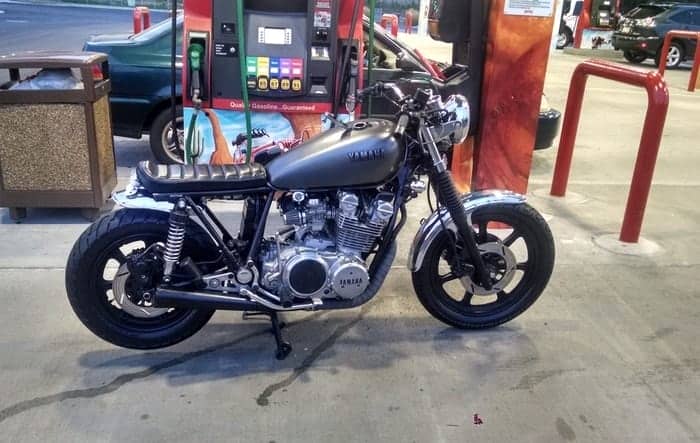
I’m an engineer for an oil and gas company and some of the false truths circulating around the internet about ethanol need to be put in check. I’m also a gear head at heart and spend every day after work in my garage, so I’m going to give an unbiased and straightforward answer about what ethanol is and isn’t.
Is ethanol bad for motorcycles? E10, or gasoline with up to 10% ethanol is not an ideal fuel for motorcycles or small engine machines. Ethanol fuel has a shorter shelf life, leads to higher carbon buildup, gums up carburetors, and eats away at rubber parts faster than ethanol-free fuel.
In fact, I wouldn’t recommend ethanol fuel for any carbureted vehicle. But fuel injected vehicles are a different story, I’ll explain more about fuel injection later.
What Is Ethanol?
Ethanol, or ethyl alcohol, is a refined chemical that is found in drinking alcohol, over the counter disinfectants, and an array of other chemicals. It has the chemical formula C2H6O, and readily mixes with unleaded fuel.
Before fuel can be sold at gas stations it must meet certain chemical specifications. It can only have a certain amount of sulfur content, it has to have a specific freezing point, and it has to have a very tight tolerance of its octane number. Samples are being pulled constantly from lines to make sure the fuel is all on-spec.
Raising a product’s octane number is expensive. The higher the octane, the more expensive it is to manufacture that product. The octane number of ethanol ranges anywhere from 100-135, that’s why adding a little bit of ethanol to gasoline can boost its octane number from 80 to 85 or 87, which is what customers see at the pump.
Ethanol in gasoline is simply an octane booster. There are pros and cons to its use in small engines which I’ll discuss further.
Misconceptions About Ethanol
There is a lot of nonsense about ethanol online that needs to be cleared up. No, it’s not going to ruin your engine if you use it, oil refineries wouldn’t be using it as an octane booster if that were the case. That would ruin their reputation with shareholders and stock prices would plummet.
Ethanol does not raise gas prices, in fact it does the opposite for customers. Ethanol is a cost-effective way of boosting your fuel’s octane number. Other means of octane boosting are much more expensive, and that extra manufacturing cost would be reflected in higher gas prices at the pump.
Ethanol is fairly cheap to produce at a refinery. Oil refineries are able to keep gas prices down for the customer by using ethanol to boost the octane number, that way the fuel meets all the government specifications before it leaves for the gas station.
Ethanol added to gasoline is not a new idea. It has been a pretty common thing since the 1920’s in order to boost the octane of fuel used in wars, racing applications, and many other purposes. Gas companies have done a good job at being more transparent about its use, that’s why it has become more of a point of contention in the last 10 years. If not for the 10% ethanol sticker at the pump most people wouldn’t think twice about it.
Many believe that ethanol burns dirtier than traditional gasoline and is worse for the environment; the opposite is true. Ethanol is fully bio-degradable and releases fewer emissions into the environment than most other fuel additives.
For more misconceptions about ethanol used in gasoline see this PDF published by the US Department of Energy.
Is Ethanol Bad For Carbureted Motorcycles?
I would not recommend using ethanol in any vehicle that has a carburetor. In college I helped pay for my tuition by rebuilding classic motorcycles and doing repair work for people.
I have rebuilt close to 100 carburetors (most of them for motorcycles) and the vast majority of the carb problems I encountered could have been avoided if people would have used ethanol free fuel and emptied their carburetor when they parked their motorcycle for the winter.
Ethanol readily absorbs into water, unlike traditional gasoline. It also has a much shorter shelf life than ethanol-free gasoline which is a dangerous 1-2 combo for carburetors. Even if ethanol fuel is left in a carburetor for a few months it can set up into a gel-like substance and clog up all the carburetor jets and require a full carburetor rebuild.
I get a lot of questions from coworkers and friends about their motorcycles and classic vehicles when they won’t start. The first questions I ask are: “Is the battery fully charged to 12.6 volts?”, “Is it carbureted?”, and “Do you use ethanol-free gas?”
And almost always they tell me that they can’t remember what type of fuel they put in last time it ran. Which, if they had been religiously putting in ethanol-free fuel like they should have been then that would be something they would remember.
The same thing goes for lawn mowers, weed eaters, chainsaws, and other small gas-powered machines. Those small carburetor jets get plugged so easily and if you use ethanol fuel, you’re just asking for those jets to gum up.
I have created a video series about restoring motorcycles from start to finish and within this series includes a detailed 25 minute video on how to clean and rebuild carburetors after using ethanol gas. This series also includes other hard-to-tackle components such as body work and electrical. I give dozens of tips and tricks that you won’t find anywhere else online. Click here for more information if you’re interested in viewing multiple videos that will help fix up your bike or if you’re interested in completely building your dream motorcycle!
Is Ethanol Bad For Fuel Injected Motorcycles?
My answer for fuel-injected vehicles is different. Ethanol is not near as bad for fuel-injected vehicles and I use 85 octane ethanol fuel in my daily driven Jeep almost exclusively. The high pressure fuel injection system pushes out any clogs that might start to build up in the injectors.
Fuel injectors are similar to carburetors in the sense that it delivers the right amount of fuel to the motorcycle engine. But unlike a carburetor, a fuel injector is electrically powered. The ECU has several sensors around the motorcycle that determines how much fuel the motorcycle needs. Fuel injection also requires pressurized fuel which is one of the biggest difference between it and a carburetor.
If you have a fuel injected motorcycle then you can follow a similar practice to what I do in my Jeep. Every 5th or 6th time I fill up the Jeep I use 91 octane ethanol-free fuel from one of the highest tier gas stations like Shell, Chevron, or Exxon. Those top tier stations all have their own additive that cleans your intake manifold, valves, and cylinders.
You don’t have to use those high octane fuels exclusively in order to enjoy their benefits. At minimum, every few fill ups with high octane gas will be sufficient for a fuel injected motorcycle. Unless you have a high-compression or high performance engine that strictly calls for 91+ octane ethanol-free fuel, then be sure to follow your manufacturer’s directions.
Is Ethanol Bad For Engines?
All EPA government testing for new car and motorcycle models is done with high octane ethanol-free fuel in order to achieve the best fuel mileage possible. Ethanol fuel gets worse gas mileage than ethanol-free fuel. You will get between 2%-5% worse fuel mileage with ethanol fuel.
Ethanol tends to leave more carbon buildup on valves and pistons than ethanol-free fuel does. This is one of the main reasons that I recommend to use ethanol-free fuel at least every 5th-6th fill up for fuel injected motorcycles (and for every fill up on carbureted motorcycles), so it can clean all those high heat parts effectively and the carbon doesn’t continue to build up.
To be completely realistic, how hard you ride your motorcycle does exponentially more damage to your engine than using ethanol fuel does.
The Type Of Fuel Should You Use On A Motorcycle
I do not use ethanol in my motorcycles because they are all old carbureted bikes. Many people choose every time to fill up their fuel injected motorcycle with 91+ octane fuel that is ethanol free instead of doing it every 5th or 6th time they get gas. That’s an excellent way of taking care of the fuel delivery system.
Filling up a motorcycle is only a few gallons, so the price doesn’t really make that much of a difference. You might as well get the good fuel. With how good of fuel mileage motorcycles get, the extra price for ethanol-free fuel almost pays for itself in increased fuel economy.
I always tend to stay on the safe-side when it comes to motorcycles simply because if any little thing goes wrong it can cause a horrible accident. Like a misfire for example. Ethanol fuel is more likely to backfire, and something small like that can cause a driver to jerk and lose control.
If you want to stay on the safe side, use high octane ethanol-free gas every time you fill up. For more information about what kind of fuel a motorcycle should use, see my other article here.

